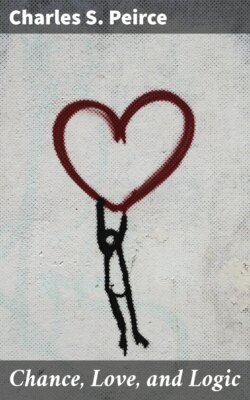Chance, Love, and Logic

Реклама. ООО «ЛитРес», ИНН: 7719571260.
Оглавление
Charles S. Peirce. Chance, Love, and Logic
Chance, Love, and Logic
Table of Contents
PREFACE
INTRODUCTION
I
II
III
IV
PROEM. THE RULES OF PHILOSOPHY[25]
PART I. CHANCE AND LOGIC (ILLUSTRATIONS OF THE LOGIC OF SCIENCE)
CHANCE AND LOGIC. FIRST PAPER. THE FIXATION OF BELIEF[26]
I
II
III
IV
V
SECOND PAPER. HOW TO MAKE OUR IDEAS CLEAR[31]
I
II
III
IV
THIRD PAPER. THE DOCTRINE OF CHANCES[34]
I
II
III
IV
V
FOURTH PAPER. THE PROBABILITY OF INDUCTION[40]
I
II
III
IV
V
FIFTH PAPER. THE ORDER OF NATURE[44]
I
II
III
IV
V
SIXTH PAPER. DEDUCTION, INDUCTION, AND HYPOTHESIS[51]
I
II
III
IV
V
PART II. LOVE AND CHANCE
I. THE ARCHITECTURE OF THEORIES[54]
II. THE DOCTRINE OF NECESSITY EXAMINED[59]
III. THE LAW OF MIND[61]
WHAT THE LAW IS
INDIVIDUALITY OF IDEAS
CONTINUITY OF IDEAS
INFINITY AND CONTINUITY, IN GENERAL
ANALYSIS OF TIME
THAT FEELINGS HAVE INTENSIVE CONTINUITY
THAT FEELINGS HAVE SPATIAL EXTENSION
AFFECTIONS OF IDEAS
IDEAS CANNOT BE CONNECTED EXCEPT BY CONTINUITY
MENTAL LAW FOLLOWS THE FORMS OF LOGIC
UNCERTAINTY OF MENTAL ACTION
RESTATEMENT OF THE LAW
PERSONALITY
COMMUNICATION
CONCLUSION
IV. MAN’S GLASSY ESSENCE[63]
V. EVOLUTIONARY LOVE[72] AT FIRST BLUSH. COUNTER-GOSPELS
SECOND THOUGHTS. IRENICA
A THIRD ASPECT. DISCRIMINATION
Supplementary Essay THE PRAGMATISM OF PEIRCE BY John Dewey
BIBLIOGRAPHY OF PEIRCE’S PUBLISHED WRITINGS
Отрывок из книги
Charles S. Peirce
Philosophical Essays
.....
Table of Contents
Peirce preferred to call himself a logician, and his contributions to logic have so far proved his most generally recognized achievement. For a right perspective of these contributions we may well begin with the observation that though few branches of philosophy have been cultivated as continuously as logic, Kant was able to affirm that the science of logic had made no substantial progress since the time of Aristotle. The reason for this is that Aristotle’s logic, the logic of classes, was based on his own scientific procedure as a zoologist, and is still in essence a valid method so far as classification is part of all rational procedure. But when we come to describe the mathematical method of physical science, we cannot cast it into the Aristotelian form without involving ourselves in such complicated artificialities as to reduce almost to nil the value of Aristotle’s logic as an organon. Aristotle’s logic enables us to make a single inference from two premises. But the vast multitude of theorems that modern mathematics has derived from a few premises as to the nature of number, shows the need of formulating a logic or theory of inference that shall correspond to the modern, more complicated, practice as Aristotle’s logic did to simple classificatory zoology. To do this effectively would require the highest constructive logical genius, together with an intimate knowledge of the methods of the great variety of modern sciences. This is in the nature of the case a very rare combination, since great investigators are not as critical in examining their own procedure as they are in examining the subject matter which is their primary scientific interest. Hence, when great investigators like Poincaré come to describe their own work, they fall back on the uncritical assumptions of the traditional logic which they learned in their school days. Moreover, “For the last three centuries thought has been conducted in laboratories, in the field, or otherwise in the face of the facts, while chairs of logic have been filled by men who breathe the air of the seminary.”[16] The great Leibnitz had the qualifications, but here, as elsewhere, his worldly occupations left him no opportunity except for very fragmentary contributions. It was not until the middle of the 19th century that two mathematicians, Boole and DeMorgan, laid the foundations for a more generalized logic. Boole developed a general logical algorithm or calculus, while DeMorgan called attention to non-syllogistic inference and especially to the importance of the logic of relations. Peirce’s great achievement is to have recognized the possibilities of both and to have generalized and developed them into a general theory of scientific inference. The extent and thoroughness of his achievement has been obscured by his fragmentary way of writing and by a rather unwieldy symbolism. Still, modern mathematical logic, such as that of Russell’s Principles of Mathematics, is but a development of Peirce’s logic of relatives.
.....